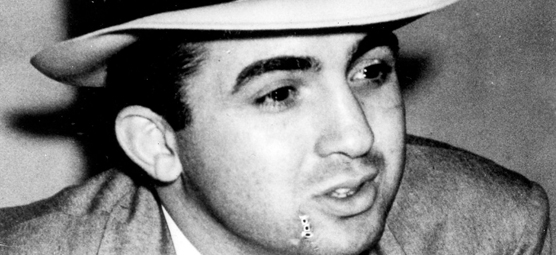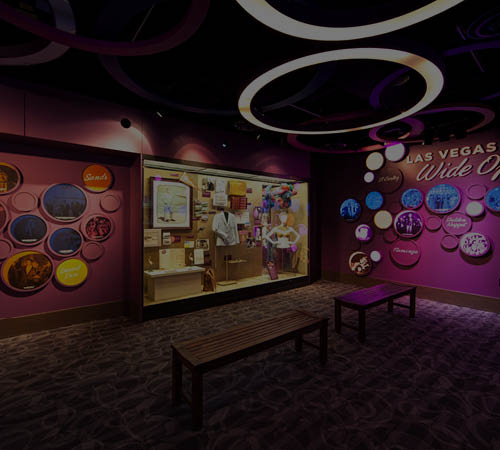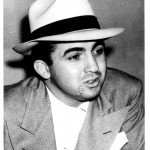Mickey Cohen ran high-stakes gambling in L.A.

“In rich and hedonistic Los Angeles, where many of the Golden Age movie moguls participated in high-stakes gambling on a daily basis and some even traveled with their bookies, the ‘rug-joints,’ as the Mob’s luxury illegal casinos were called, added much to the coffers.” This excerpt from my book, Mickey Cohen: The Life and Crimes of L.A.’s Notorious Mobster, is set during World War II and focuses on Cohen’s gambling operations.
Opening a commission betting office in a paint store at 8109 Beverly Boulevard, Mickey Cohen became a bookie’s bookie. In the tiny, unassuming one-story building emblazoned with signage for “Kon-Kre-Kota,” an asbestos-based “Wonder Paint,” Cohen placed hedges on huge wagers with other syndicate offices across the country and booked off-track for major bettors, usually horse owners and jockeys.
He later divulged the inner workings of the “paint shop”: “At the peak of my operation I dealt with from six to eight offices throughout the country, and my transactions with each office amounted to anywhere from $30 to $150,000 a day [approximately $360,000 to $1.6 million today] with each office . . . Some offices paid me from 2½ to 5 percent for the monies . . . Our main source of revenue . . . was the percentage of commission we got for moving the bet.” He once confided in Hearst editor Jim Richardson, “You want to know how gambling money is made? . . . We need only one fixed fight or horse race a year in each territory. Ten or twelve of these a year around the country. The word goes out, and you get the big bets down.”
The La Brea Social Club, another of Cohen’s “babies,” was nearby in a beautiful Venetian Revival building on La Brea Avenue, near Beverly Boulevard. The private two-floor casino was decorated with photographs of boxing’s greatest champions and included a restaurant. Catering exclusively to professional gamblers, and a few affluent Hollywood businessmen “who stuck their noses in,” it featured a rich-moneyed, Chicago-style crap game — a first for L.A.
Mickey confirmed, “The money craps were in private quarters so as to give the players a feeling of security, as there were at times a much as $150,000 to $200,000 [$350,000 to $600,000 today] in cash on the table.” The operation also doubled as a meeting ground for his men and clearinghouse for his activities.
For eight months in 1944 he ran an exclusive party house at 9100 Hazen Drive, deep in the Coldwater Canyon hills. After midnight, when the wartime curfew shut down the nightclubs on the Sunset Strip, the Spanish-style mansion became popular with the rich and famous. Open until dawn, the specialty of the house was high-stakes games of chemin de fer and baccarat. Serving no one without a reservation, Mickey offered gourmet dining, a sommelier, and a swing band with comely girl singers who, “when the occasion called for it,” could sing risqué lyrics. Beautiful party girls were employed as shills, steerers, and escorts.
“There was never an evening that we did not turn away thirty to forty couples who were not suitable or did not fit into the surroundings and atmosphere, or with the personalities who were in the club,” he recalled. “The operations were so fabulous and high that our investment was quickly recovered.”
Neighbors worked to close the enterprise. They leaked the story of the “Mystery House” to the press — although Cohen’s association remained hidden. Several nights in a row the media were alerted when residents blocked the revelers from crossing the narrow residential lane. Cohen later sniffed that when the City Attorney’s office did not respond to the neighbors’ protests “as quickly as they thought the matter warranted, they formed a vigilante committee and took the law in their own hands to form a human blockade of the private road leading to this mystery establishment.” He added, “The newspapers made quite a thing out of the affair . . . with the movie names that were intermingled with the situation.” Their effort proved successful. The gamblers moved on.
Annexing several suites in the exclusive Ambassador Hotel, the Mick opened a high-stakes “money crap game” for a handpicked clientele. He explained, “At the time I was close to some people at the Ambassador Hotel who had to do with the operation of that establishment. I contacted these people and offered them a deal . . . Most of the boys working at the hotel were friendly to me and, knowing that this operation would add much to their own pockets, were very cooperative. We had quite a run in the Ambassador.”
Tereba will be signing copies of her book, Mickey Cohen: The Life and Crimes of L.A.’s Notorious Mobster, from 1-5 p.m. Saturday, March 14, in The Mob Museum retail store.
Courtesy of Tere Tereba and ECW Press. Copyright 2012 by Tere Tereba. All Right Reserved.
Feedback or questions? Email blog@themobmuseum.org






